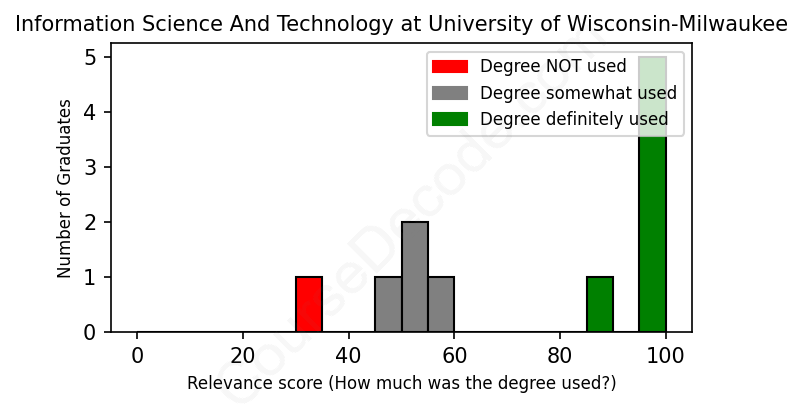
First, some facts. Of the Information Science And Technology graduates from University of Wisconsin-Milwaukee we've analyzed , here's how many have used (or NOT used) their degree in their career:

These are estimates based on AI analysis of 11 LinkedIn profiles (see below).
The verdict? Above average. Overall, with an average relevance score of 75%, Information Science And Technology graduates from University of Wisconsin-Milwaukee have a higher likelihood (+8%) of finding work in this field compared to the average graduate across all fields:
And for comparison, here's the chart for all profiles we've looked at across all degrees.
Also, after graduating, only 9% of these graduates have pursued further education other than another Bachelor's degree (such as a Masters degree or other), compared to the average across all profiles of 35%. This suggests a Bachelors degree is enough for most Information Science And Technology graduates, and it's normal to look for work straight after graduation.
See the details:
|
Relevance score: 100% We think this person has gone into a career highly relevant to their degree. We think this person has gone into a career highly relevant to their degree.
DEGREE INFOGraduated in 2018 from University of Wisconsin-Milwaukee with a Bachelors Degree in Information Science And Technology. No other secondary education since. JOB HISTORY SINCE GRADUATIONIT Consultant Kohl's Sep 2018 - Oct 2018 ABOUTI graduated magna cum laude from the University of Wisconsin-Milwaukee with Commencement Honors within my major of Information Science & Technology in May 2018. |
The top 10 most common jobs done by the graduates we've analyzed (ranked most common to least) are:
From analyzing the job roles of graduates with a degree in Information Science and Technology from the University of Wisconsin-Milwaukee, it's clear that many of these individuals find themselves in positions related to quality assurance and software development. Roles such as Software Quality Assurance Engineer and Business Intelligence Developer are prevalent, indicating a strong alignment with the technical skills and knowledge gained during their studies. These positions often require a solid grasp of software testing, data analysis, and information management, all of which are central themes in the degree program.
However, there’s also a noticeable mix of roles that are less closely related to the core focuses of Information Science and Technology. For instance, positions like UX Project Manager and various administrative roles show that not every job directly applies the technical skills learned in college. Some graduates have even ventured into roles like Crew Member at a restaurant, which clearly don't require any specific training in information sciences. Overall, while many graduates are successfully leveraging their education in relevant fields, there’s also a segment that has drifted away from the core focus of their degree, working in positions that may not fully utilize their technical skills.
Here is a visual representation of the most common words in job titles for Information Science And Technology graduates (this is across all Information Science And Technology graduates we've analyzed, not just those who went to University of Wisconsin-Milwaukee):

So, if you take a look at what graduates of the Information Science and Technology program at the University of Wisconsin-Milwaukee are doing, it seems like they generally start off their careers in positions that are quite relevant to their degree. Many of them land roles in quality assurance, software testing, or technical writing right after graduation. For instance, several grads started as SQA Technicians, Quality Assurance Analysts, or Business Analysts, which all leverage the analytical skills and tech knowledge they gained in school. It’s a solid start because these roles are pretty much stepping stones into the tech industry, giving them a chance to build experience and further their careers.
Looking ahead five to ten years, it's clear that many of these graduates advance up the ladder within the tech field. We see a solid progression where roles evolve into more specialized and managerial positions, like Senior Software Quality Assurance Engineer and UX Project Manager. A few have even landed stable roles in larger companies, with some pretty good job titles under their belts by around the ten-year mark. While not every graduate sticks strictly to tech-focused roles—some shift into related fields like underwriting or even management in unrelated sectors—overall, it looks like those who remain in tech tend to carve out successful and fulfilling careers. So, for anyone thinking about pursuing a degree in Information Science and Technology, it appears to open up some solid doors in the job market!
Honestly, getting a Bachelor’s degree in Information Science and Technology at the University of Wisconsin-Milwaukee or anywhere else can be a mixed bag in terms of difficulty. It's not the hardest degree out there, but it does require a good amount of dedication and time, especially with the technical aspects like programming, databases, and systems analysis. If you’re already familiar with computers and tech, you might find some classes to be pretty enjoyable and manageable. But don’t underestimate the workload; there will be projects and group work that can be a bit challenging. Overall, I’d say it’s somewhere around average in terms of difficulty—definitely doable, especially if you stay organized and keep up with your studies!
Most commonly, in the LinkedIn profiles we've looked at, it takes people 3 years to finish a Bachelor degree in Information Science And Technology.
Looking at the career paths of these graduates from the University of Wisconsin-Milwaukee, it's clear that most have landed some decent jobs in the tech field, especially those who started off in quality assurance and project management roles. For instance, the 2010 graduate is now a Senior Software Quality Assurance Engineer and a UX Project Manager too, which typically pays pretty well, especially with that level of experience. The others, like the graduates from 2015 and 2016, have also gradually moved up in their respective roles, suggesting they've been able to increase their earning potential over time. On the flip side, the more recent grads like the ones from 2020, who started off with lower-level positions in the food industry, indicate they might not be making as much initially, but they're still working their way up. Overall, it seems like a lot of these folks are on solid financial paths, though some might still be climbing the salary ladder.
Here is a visual representation of the most common words seen in the "about" section of LinkedIn profiles who have a Bachelor degree in Information Science And Technology (this is across all Information Science And Technology graduates we've analyzed, not just those who went to University of Wisconsin-Milwaukee). This may or may not be useful:

Here are all colleges offering a Bachelor degree in Information Science And Technology (ordered by the average relevance score of their Information Science And Technology graduates, best to worst) where we have analyzed at least 10 of their graduates:
| College | Score | Count |
|---|---|---|
 University of Wisconsin-Milwaukee University of Wisconsin-Milwaukee
|
75 | 11 |